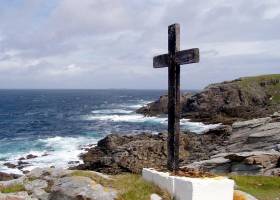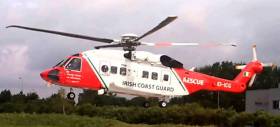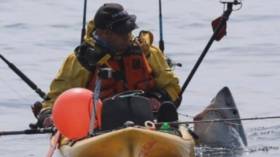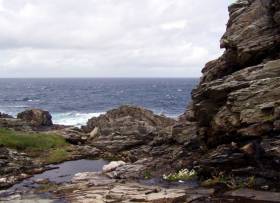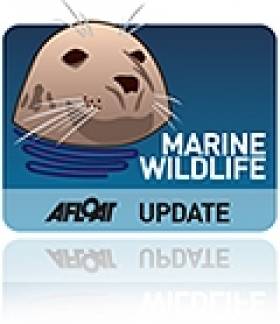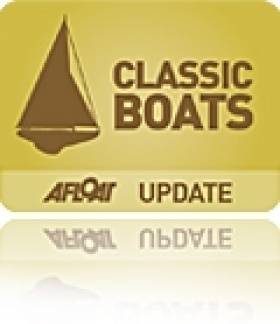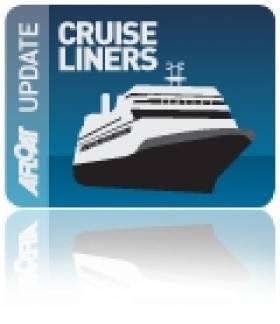Displaying items by tag: Malin Head
Malin Head Sea Heritage Group Eager to Hear Stories of the Past
Most people will know that Malin Head is Ireland's most northerly point of Ireland and the sea has affected this community forever; Malin Head used to have a large salmon fleet, it also had the biggest brown crab fishery in Europe, and over the years, the sea has allowed many families to survive in this area. The fishing fleet has changed, and there is a much smaller fleet here compared to 40 years ago.
The Malin Head Heritage group have been collecting local stories for over 25 years and publishing their findings in the Malin Head heritage booklets their next project is to try and gather as much of the history of the fishing fleet over the years.
 Fishing at Malin Head and Inishowen in yesteryear Photo: Courtesy Malin Sea Heritage Group
Fishing at Malin Head and Inishowen in yesteryear Photo: Courtesy Malin Sea Heritage Group
They are asking for people to come to their round table meet-up on Wednesday 26th at 7 pm in the Malin Head community centre to tell their stories so that they can be recorded.
"The heritage group want to hear about lobster fishing, fishing poles, trawling the Inistrahull sound and the shallow bed"
Stories and old pictures are wanted. When people look back at how difficult times were for fishermen in this area, landing at Portmor or Portronan, which were unsafe ports with no facilities.
The heritage group want to hear about lobster fishing, fishing poles, trawling the Inistrahull sound and the shallow bed, poaching trout, Salmon fishing and trying to avoid the naval services on both sides depending on what licence you had, gathering seaweed or picking winkles, catching 80-100 boxes of crab with 200 pots compared with the crab fishing today.
 Malin Head fishermen Photo: Courtesy Malin Sea Heritage Group
Malin Head fishermen Photo: Courtesy Malin Sea Heritage Group
The heritage group are great at listening and is eager to learn new stories about Malin Head and Inishowen and the sea.
#MalinHead - The local man who died after a boat capsize off Malin Head in Donegal on Tuesday afternoon (17 July) lost his father in the same area four decades ago, it has emerged.
According to the Irish Independent, Gerry ‘Malin’ Doherty drowned close to where his father Paddy ‘Malin’ Doherty perished after slipping into the water from rocks in 1979.
Gerry Doherty and 16-year-old Thomas Weir died on Tuesday after Doherty’s 16ft cabin cruiser lost power and capsized less than 1,000 metres from shore.
Rescuers recovered a third individual in his late 40s — Dessie Keenan, a relative of Weir — who has since been released from hospital.
The Irish Independent has much more on the story HERE.
Two Dead After Fishing Boat Capsize Off Donegal
#Donegal - A man in his 60s and a teenage boy have died after the fishing boat they were on capsized off Malin Head in Donegal yesterday afternoon (Tuesday 17 July).
As Independent.ie reports, it’s believed the vessel got into difficulty just minutes after setting off from Malin Pier, with three on board, around midday.
Tourists staying locally raised the alarm around 4pm after hearing cries for help, and a major search and rescue operation was launched immediately.
The teenager and a man in his 50s — both believed to be from Derry — were swiftly recovered, though the 16-year-old boy later died in hospital. The man in his 50s was also hospitalised and was said to be in a stable condition last night.
The body of the third person, a man in his 60s, was recovered on the shoreline before 6pm. He has been named locally as Gerry Doherty of nearby Carndonagh.
Independent.ie has more on the story HERE.
Angler Catches Shark in His Kayak off Donegal
After landing the huge fish, Mr Smith released it.
The experienced angler says it was "above and beyond" anything else he has experienced.
Star Wars Shoot Coming To Malin Head? Not So Fast, Says Govt
#StarWars - Rumours that Star Wars film crews are set to decamp for the Donegal coast are just that, as the Government department responsible has not confirmed permission.
According to TheJournal.ie, location scouts for Lucasfilm have been spotted in the Malin Head area searching for appropriately dramatic vistas for future instalments of the epic sci-fi film series.
But while Heritage Minister Heather Humphreys has confirmed that a "limited amount of filming" will take place on Sybil Head in Dingle later this year, no such permission has been granted for Donegal – and the minister would not comment on the existence of any talks over the same.
Star Wars fever has gripped the Kerry coast since last year as the Skelligs featured prominently in the smash hit blockbuster The Force Awakens.
But the filming has not been without its share of controversy over repairs to monastic ruins and alleged interference with protected seabird species at the Unesco World Heritage site.
More recently, a long-time guide on Skellig Michael spoke out over the State's facilitating of the two Lucasfilm shoots on the island for The Force Awakens and next year's sequel, as previously reported on Afloat.ie.
Climbers Showcase Malin Head Coastline & Ireland's Wild Atlantic Way
Irish climbers take an amazing path up from the north Atlantic Ocean to the top of Ireland's most Northerly Point - Malin Head using dizzy drone footage of Donegal rock climbing! Bren Whelan and Wild Atlantic Way Climbing, show case the great rockface, Donegal scenery and an awesome climb.
Humpback Wows Whale Watchers With Breach Off Baltimore
#MarineWildlife - Whale Watch West Cork have shared this incredible video of one of a humpback whale breaching off Baltimore this week.
The whale is one of three of the ocean giants seen feeding off Baltimore and nearby islands in recent days, and caught in some stunning shots by photographer Simon Duggan, among others.
Meanwhile, some no less impressive sights have been seen of Donegal, new video shows basking sharks - the second biggest fish in the sea - breaching off Malin Head.
Bren Whelan of Wild Atlantic Way Climbing told Independent Travel that it's been an "outstanding week" for marine wildlife watching on the North Coast, saying he himself had witnessed "over 300" basking shark breaches.
Basking sharks have been seen in big numbers the area all month long, with 15 spotted during the Irish Whale and Dolphin Group's Whale Watch Ireland 2015 event on the afternoon of 23 August alone.
#MarineWildlife - Two friends were caught by surprise by a playful pod of dolphins off Donegal's Malin Head in recent days.
And as UTV reports, one of them was quick enough to capture the exciting encounter on video.
“Apparently this area of sea is a migrating route from north to south," said Belfast fishermen Neil McCann, who was holidaying in the area with a friend.
"If you think about that, then Ireland is in the way, so they have to pass around the tip of Malin Head. Fishermen are now calling the area the dolphin capital of Ireland.”
The headland on the Inishowen Peninsula, which marks the northern end of the Wild Atlantic Way, has also been hailed this week for its potential as a 'shark park' reserve, with all the makings of a major marine wildlife tourist attraction.
Diver's Haunting Photos Of Malin Head's 'Lost Ships'
#Shipwrecks - Mail Online is hosting some astounding photographs of wrecks lost off Malin Head during the World Wars as captured by amateur diving enthusiast Steve Jones.
The Welshman made his way around the final resting places of four military and supply vessels – HMS Audacious, SS Justicia, SS Empire Heritage and SS Laurentic – off the Donegal coast during a recent dive expedition.
The latter of these ships is believe to still hold £6 million (€7.6 million) in gold bars somewhere in or around its ghostly hull, though Jones and his team had no luck finding them.
They did however find the seaweed-blanketed remains of a number of Sherman tanks that were being transported by the SS Empire Hertiage.
The so-called 'lost ships of Malin Head' are just some of the numerous wreck sites off the North Coast that was a strategic route for the Allies during both wars and as such a prime target for torpedo and mine attacks.
Mail Online has more on the story HERE.
Cruise Ships Sector to Boost Donegal
#CruiseDonegal – Donegal Now.Com reports that the Inishowen Peninsula in the north of the county is set to cash in on the lucrative cruise ship business in years to come.
Malin Head is likely to be one of the main visitor attractions. Donegal Co. Council is backing a Loughs Agency initiative that will see around €170,000 invested in upgrading facilities at Greencastle Harbour.
This will allow tenders boats to ferry in passengers from cruises to Donegal. To read more click HERE.



























